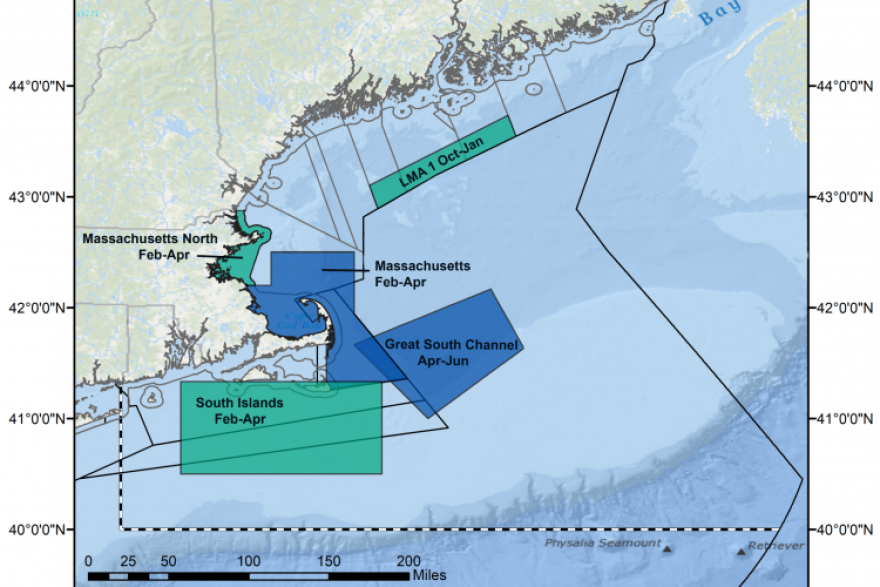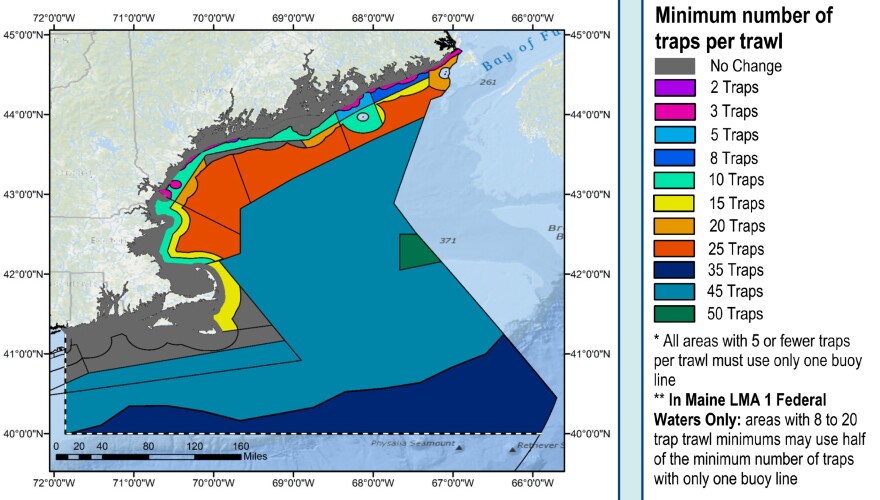Federal regulators issued new rules Tuesday for lobster and other trap-pot fisheries that aim to protect endangered North Atlantic right whales from harmful entanglements with fishing gear. The lobster industry and its political allies in Maine are condemning the decision, but conservationists say it doesn't do enough to protect the whales.
Among several significant measures, the new rule includes the seasonal closure of some 967 square miles of fishing grounds in federal waters about 30 miles off Maine's midcoast, from October through January. It's an area used by boats based at ports from Mount Desert Island to Rockland to Boothbay.

State Rep. Billy Bob Faulkingham is a Winter Harbor lobsterman. Reached by phone while hauling his traps, Faulkingham acknowledges that most of Maine's lobster fleet will not be affected by the new rule because they fish relatively near shore, where federal scientists say whales are unlikely to swim.
But, he notes, the big trawlers working farther out account for about half the value of Maine's lobster landings. And Faulkingham says he is shocked that the feds would impose an annual harvest ban during the prime late fall to early winter season.
"That's right in the middle of the best fishing for the offshore area. That's when we make all of our money. That could not be any worse of a closure... It's inexplicable why they would do that, just to give us some punishment? It doesn't make sense,” Faulkingham says.
Federal officials say that as many as 62 Maine-based lobster boats fish those waters, and they estimate losses of up to $1.2 million dollars in landings in the first year alone. That assumes that they don't turn to fishing with so-called "ropeless" gear, a recent technology that would be allowed in the restricted area, but which most Maine lobstermen say won't work and is prohibitively expensive.

Officials at the National Oceanic and Atmospheric Administration say the agency had to weigh the cost to fishermen against the whales survival.
"We did our best to balance both of those needs,” says Marisa Trego, a coordinator for whale issues at the National Oceanic and Atmospheric Administration.
Trego says data show fishermen place a lot of trap-rope in the water in the closure area at a time when right whale activity has been detected in recent years.
"Unfortunately that time period is when the hot spot is anticipated and when the highest risk for right whales is. So unfortunately that was just an overlap,” Trego says.
Other costs will come from rules requiring the adoption of weaker "breakaway" rope or rope-links. And for the boats that head more than three miles offshore, the rule increases the number of traps that must be used per line -- thus reducing the overall amount of rope in the water.
The feds estimate that in the first year the new regulations -- which include a new closure off Massachusetts too -- will cost east coast lobster and Jonah crab fishermen as much as $20 million in added costs and lost revenues. Yet while the lobster industry and Maine politicians are decrying the new rules, conservation groups say they do not go far enough.
"It continues to put whales at risk, across their life history,” says Gib Brogan, a fisheries analyst at Oceana, an international group. He says the rule relies too heavily on weak links or weak rope to reduce risk for the whales. There's little direct evidence, he says, that weak rope reduces death from entanglements.
"And even if it does those entanglements are still causing stress to the animals and we've seen in recent studies over this past summer that the whales are getting smaller, that they are not producing as frequently or as successfully as they have. So by relying on weak rope that is not giving the right whales the protection that they need,” Brogan says.
The North Atlantic right whale population has dropped over the last decade to around 370, but 18 calves were born this year - the most since 2000. Most of the new rule will go into effect next May. But the seasonal the closure off Maine, the feds say, will be enforced starting this October.
The change is part of federal regulators' goal of obtaining a 98% risk reduction to the endangered North Atlantic right whales by 2030. But Democratic Gov. Janet Mills, along with U.S. Sens. Susan Collins and Angus King, as well as U.S. Reps. Chellie Pingree and Jared Golden, say the restrictions threaten the livelihoods of lobstermen and women and that the industry hasn't seen a whale entanglement in nearly two decades.
In a statement, the delegation the new regulations unacceptable and unfair, and says that ship strikes and Canadian snow crab gear pose a greater risk to the whales.



